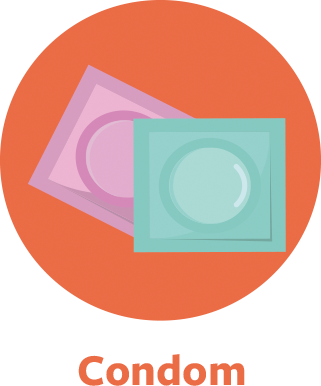Chlamydia

Like gonococcus, bacteria that cause urethritis in men include Chlamydia trachomatis, Ureaplasma urealyticum, and Mycoplasma genitalium. Chlamydia is the most common of these. Of these, most females with cervicitis are chlamydia. Chlamydia is one of the most common sexually transmitted diseases of both sexes. Male urethritis has symptoms such as pain when urinating, cloudy fluid coming out of the urethra, and frequent urge to urinate. As it progresses and causes epididymitis, the scrotum swells and ache. Most women with Chlamydia cervicitis have little or no symptoms, but they progress to peritonitis inside the pelvis and abdominal cavity, or inflammation of the tube (oviduct) that connects the ovaries and uterus. Also, it may cause severe pain in the lower abdomen, and severe cases can lead to infertility and ectopic pregnancy. Infection to the throat may also be seen but there are almost no symptoms.
Pregnant woman can cause conjunctivitis or pneumonia to the newborn through delivery.
Route of infection and prevention
You ca be infected with Chlamydia though contact with the semen, vaginal secretions, and pharyngeal mucosa contact the mucous membrane of your sexual partner. Since in many cases there are often no symptoms or only mild symptoms, there is a risk of spreading the infection without knowing it.
Using condoms is very important for prevention.
Pregnant woman with Chlamydia can infect the eyes of the fetus during labor, causing conjunctivitis and pneumonia to the newborn. Medical examination for pregnant women is important to prevent infections in newborns.
Testing
PCR tests (a method to detect genetic material particular to Chlamydia) are performed by taking swab samples of secretions and urine from the cervix, penis, throat and rectum.
While cervicitis in women is less likely to cause symptoms, but it can have significant long-term effect. If you feel that you are at risk, please have yourself tested and start the treatment as soon as possible.
Treatment
If you are diagnosed with Chlamydia, you will be treated by antibiotics. Encourage your sexual partner to get tested and if needed, start the treatment as soon as possible.
Chlamydia and Gonococcal infections have similar symptoms and may be treated at the same time if partners are both infected.
Please refrain from having sexual intercourse for at least one week after the start of treatment, as there is a risk of infecting your sexual partner. The risk of reinfection is also high, so retesting may be done some time after treatment.

